

The manual of museum learning. A Manifesto For Museums: Building Outstanding Museums For The 21st Century - National Museum Directors' Council Website. 9 March 2004 Today museums across the country have joined together to publish A Manifesto for Museums, calling for a five-year programme of investment to sustain their current success and build for the future.
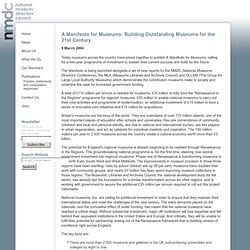
The Manifesto is being launched alongside a set of new reports by the NMDC (National Museums Directors' Conference), the MLA (Museums Libraries and Archives Council) and GLLAM (The Group for Large Local Authority Museums) which demonstrate the contribution museums make to society and underline the case for increased government funding. A total of £115 million per annum is needed for museums: £35 million to fully fund the "Renaissance in the Regions" programme for regional museums, £50 million to enable national museums to carry out their core activities and programme of modernisation, an additional investment of £15 million to fund a series of innovative joint initiatives and £15 million for acquisitions. Britain's museums are the envy of the world. The key facts are: Usable Knowledge: Learning in museums. Museums and other informal learning settings can invite students to become engaged in exhibits and activities.
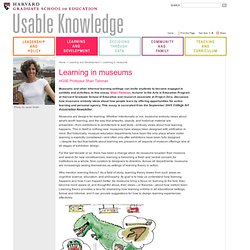
In this essay, Shari Tishman, lecturer in the Arts in Education Program at Harvard Graduate School of Education and research associate at Project Zero, discusses how museums embody ideas about how people learn by offering opportunities for active learning and personal agency. This essay is excerpted from the September 2005 College Art Association Newsletter. Museums are designs for learning. Whether intentionally or not, museums embody views about what's worth learning, and the way that artworks, objects, and historical material are presented—from exhibitions to architecture to wall texts—embody views about how learning happens. Ökológiai kultúra és környezeti nevelés. 04TV_tarsulasok. Green Pack Online: Environmental Components - Biodiversity.
Acidification Agriculture Air Biodiversity Chemicals Citizens’ Rights Climate Change Consumer Society Energy Forestry Health and the Environment Industry.
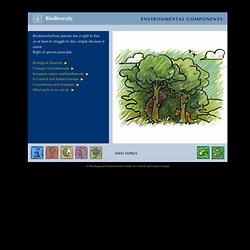
OpenScienceResources. Untitled-12. 2012 Conference Workshop: Natural Europe Learning Pathways. 2010-Horizon-Report-K12. Use of Commercial Games for Educational Purposes: Will Today’s Teacher Candidates Use them in the Future? World Conference on Educational Multimedia, Hypermedia and Telecommunications, ISBN 978-1-880094-60-0 Publisher: Association for the Advancement of Computing in Education (AACE), Chesapeake, VA Abstract The use of computer games in educational settings has been discussed by many educators.
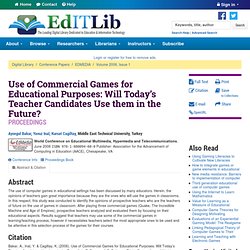
Herein, the opinions of teachers gain great importance because they are the ones who will use the games in classrooms. In this respect, this study was conducted to identify the opinions of prospective teachers who are the teachers of future on the use of games in classroom. After playing three commercial games (Quake, The Incredible Machine and Age of Empires), prospective teachers analyzed and evaluated them by focusing on their educational aspects. Citation Bakar, A., Inal, Y. & Cagiltay, K. (2006). Prospective_teachers. Virtual reality simulation training can improve inexperienced surgeons' endovascular skills. Smith 2007. How to Use Social-Networking Technology for Learning. Why teachers should embrace networking, and how they can use it to improve education.
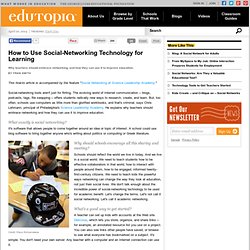
This how-to article is accompanied by the feature "Social Networking at Science Leadership Academy. " Social-networking tools aren't just for flirting. The evolving world of Internet communication -- blogs, podcasts, tags, file swapping -- offers students radically new ways to research, create, and learn. But, too often, schools use computers as little more than glorified workbooks, and that's criminal, says Chris Lehmann, principal of Philadelphia's Science Leadership Academy. Online social networks as formal learning environments: Learner experiences and activities. George Veletsianos and Cesar C.
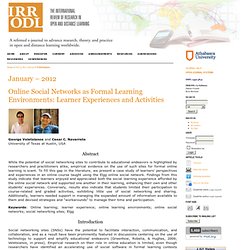
Navarrete University of Texas at Austin, USA Abstract While the potential of social networking sites to contribute to educational endeavors is highlighted by researchers and practitioners alike, empirical evidence on the use of such sites for formal online learning is scant. To fill this gap in the literature, we present a case study of learners’ perspectives and experiences in an online course taught using the Elgg online social network.
Digital Natives, Digital Immigrants. The Education Arcade. Molecular Workbench - An Interface to the Molecular World. Lure of the Labyrinth. An Error Occurred Setting Your User Cookie. This site uses cookies to improve performance.

If your browser does not accept cookies, you cannot view this site. Setting Your Browser to Accept Cookies There are many reasons why a cookie could not be set correctly. Below are the most common reasons: You have cookies disabled in your browser. Why Does this Site Require Cookies? Best of the Web Nominations 2012. Museums and the Web 2011 (MW2011): Sessions. The Museum of the Future—your vision reflected here? A friend who works with, but not in, museums has asked me for predictions regarding characteristics of the museum of the future.
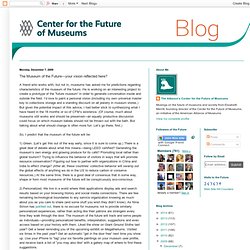
He is working on an interesting project to create a prototype of the “future museum” in order to generate conversation inside and outside the field. I’d love to paint a personal vision (including my own universal master key to collections storage and a standing discount on all jewelry in museum stores.) But given the potential impact of this advice, I had better stick to synthesizing what I have heard in the 18 months or so of CFM’s existence. (Of course, much about museums still works and should be preserved—an equally productive discussion could focus on which museum babies should not be thrown out with the bath.
But talking about what should change is often more fun. So, I predict that the museum of the future will be: 1) Green. 2) Personalized. Museums and the Web 2007: Papers: Urban, R., et al., A Second Life for Your Museum: 3D Multi-User Virtual Environments and Museums. Richard Urban, Graduate School of Library and Information Science, University of Illinois at Urbana-Champaign; Paul Marty, Florida State University; and Michael Twidale, Graduate School of Library and Information Science, University of Illinois at Urbana-Champaign, USA Abstract The paper gives an overview of some of the museum-like activities currently being undertaken in Second Life.
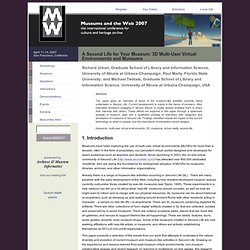
Current development is mainly in the hands of pioneers, often interested amateurs engaging in serious leisure to create spaces enabling them to share their interests with others. These efforts are explored in this paper through a systematic analysis of museum visits and a qualitative analysis of interviews with designers and developers of museums in Second Life. Findings identified include the impact of the current technology on what is created, and the importance of interaction-centric designs. James Gee: Games and Learning: Teaching as Designing. There is something of a rage these days for game-based learning in and out of schools.
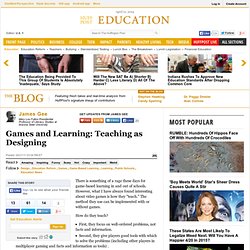
However, what I have always found interesting about video games is how they "teach. " The method they use can be implemented with or without games. Ritterfeld_C005. Untitled. Proceedings659-666. Game-based Learning - MinecraftEdu wiki. Game-based Learning From MinecraftEdu wiki Jump to: navigation, search. Learning Principles - Teaching Excellence & Educational Innovation. The following list presents the basic principles that underlie effective learning. These principles are distilled from research from a variety of disciplines. Students’ prior knowledge can help or hinder learning.Students come into our courses with knowledge, beliefs, and attitudes gained in other courses and through daily life.
Iskolakultura_2011_06-07_003-011. Promoting Active Learning Using Games. Two to Three Years: Game-Based Learning « 2010 Horizon Report: The K12 Edition. International Science Olympiads. Destination Imagination. Odyssey of the Mind. Ab00567. Assess13. Carl R. Rogers, Freedom to Learn (1969) Personal Thoughts on Teaching and Learning (1952) I wish to present some very brief remarks, in the hope that if they bring forth any reaction from you, I may get some new light on my own ideas. a) My experience is that I cannot teach another person how to teach. I am almost afraid I may seem to have gotten away from any discussion of learning, as well as teaching. Let me again introduce a practical note by saying that by themselves these interpretations of my experience may sound queer and aberrant, but not particularly shocking.
It is when I realize the implications that I shudder a bit at the distance I have come from the commonsense world that everyone knows is right. A.) I think I had better to stop here. Inquiry-based Learning. Inquiry-based Learning Visual Concept Diagram Description. Primas - What exactly does inquiry-based learning mean. Author: PRIMAS-team Inquiry-based learning aims to develop and foster inquiring minds and attitudes that are vital for pupils being able to face and manage uncertain futures.
Fundamentally, learning is based on pupils adopting an active, questioning approach. Pupils inquire and pose questions, explore and evaluate. The problems they address seem real to them. Primas-project. Primas. How%20effective%20is%20inquiry-based%20learning%20in%20linking%20teaching%20and%20research. Independent Together: Supporting the Multilevel Community. <div class="enablejs">Please enable javascript in your browser to view the printer friendly page.
STEMArticle-Many-Levels-of-Inquiry. Banchi and Bell (2008) - Four levels of inquiry-based science education. Banchi, H. & Bell, R. (2008). The Many Levels of Inquiry. Science and Children, 46(2), 26-29, Environmental inquiry a pedagogical framework. Wharlen_inquiry_mtg_paper. Új Pedagógiai Szemle1999 május - EPA - www.epa.hu.
Nahalka István. IBL%20-%20Report%20-%20Appendix%20A%20-%20Review. Paper. Social_Constructionist_Movement. MyPISA - Database. If you are interested in the PISA 2000's data, please click here to go to PISA 2000 Database If you are interested in the PISA 2003's data, please click here to go to PISA 2003 Database If you are interested in the PISA 2006's data, please click here to go to PISA 2006 Database If you are interested in the PISA 2009's data, please click here to go to PISA 2009 Database If you are interested in the PISA 2012's data, please click here to go to PISA 2012 Database.
HAT_allasfoglalasa_a_NAT_rol. Inquiry-based Learning: Explanation.